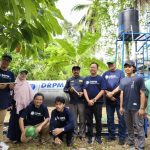Smoke-Free Incinerator Innovation from the ITB FTMD Team for Neighborhood Communities
Bandung – Waste management in Bandung City continues to face major challenges as the volume of garbage increases and disposal capacity remains limited. Data from the National Waste Management System (SIPSN) in 2023 recorded that of a total 17 million tons of waste, about 33% was still not properly managed, while final disposal sites (TPA) exceeded capacity, causing waste buildup at the neighborhood (RT/RW) level. One example is RW 10, Sukamiskin, Arcamanik. Ineffective waste management has led to problems such as air pollution and health hazards. Various measures have been implemented, including requiring every household to sort waste by type before sending it to a TPA. However, because TPAs do not accept leaf litter, residents have had to find their own solutions.
Although residents already use biopores and maggots to process kitchen waste and follow the “Kang Pisman” program of sorting trash before disposal, leaf and branch waste from street and park cleaning remains an unresolved issue.
Composting alone cannot fully handle the daily accumulation of leaves. When composting sites reach capacity, residents often burn the leaves, a practice that pollutes the air and harms health.
To address this problem, local residents—supported by a team from ITB’s Faculty of Mechanical and Aerospace Engineering (FTMD) led by Prof. Dr. Ir. Ari Darmawan Pasek, Ph.D., together with Dr.-Ing. Willy Adriansyah, S.T., M.T., and Sekar Pratiwi, a 2020 FTMD student—have introduced a small-scale incinerator system. This technology provides an effective solution for processing piles of fallen leaves, particularly from Ketapang trees, which shed frequently.
As part of FTMD ITB’s community service program, the incinerator was installed at Taman Hockey park to burn leaf waste efficiently without producing smoke that pollutes the environment. With this technology, residents who previously struggled to manage dry leaves can now burn them safely and in a controlled manner.
According to Yusuf, a local resident, the incinerator is very helpful because it no longer releases smoke into the surroundings. Besides being easy to operate, the incinerator requires no additional fuel, making the burning process more practical and environmentally friendly. Local sanitation workers can operate the unit simply by lighting a small fire with kindling and then feeding dry leaves into the incinerator.
However, operation becomes challenging during rainy weather because wet leaves do not burn optimally. To overcome this, leaves are first dried under the sun before being incinerated. Dry leaves are collected in a waste cart with a capacity of up to 1.5 m³ and burned for 4–5 hours until they turn to ash. The ash is then used as organic fertilizer to improve soil quality around Taman Hockey.
With this small-scale, smoke-free incinerator, neighborhood leaf-waste management can be handled far more effectively. The technology not only helps reduce waste volume significantly but also prevents air pollution from open burning. In addition, the resulting ash serves as organic fertilizer, creating a more sustainable waste-management cycle. This solution is expected to maintain environmental cleanliness and enhance residents’ quality of life.







